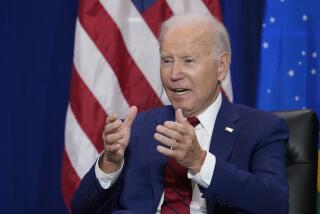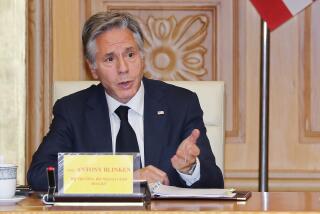U.S. Moves Toward Normal Economic Ties With Vietnam
- Share via
WASHINGTON — The Clinton administration has decided to open the way for full-scale U.S. trade and investment opportunities in Vietnam by lifting the principal obstacle to normalized economic relations between the two countries, according to senior administration officials.
President Clinton is preparing to grant Vietnam a waiver from what is called the Jackson-Vanik Amendment, the officials said. That provision bars full economic relations with a Communist country unless it permits free emigration.
The administration has concluded that Vietnam’s emigration policies have improved enough to qualify for the waiver.
Clinton’s action will enable American companies in Vietnam to qualify for a series of U.S. programs from which they have been excluded. For instance, these companies will be entitled to obtain government-backed financing for their Vietnam projects and may also insure their operations there against the risk of political upheavals.
The waiver is also one of the principal steps required for Vietnam to obtain full trading privileges in this country, known as most-favored-nation status, although other legal requirements will delay this process for a year or so.
The Hanoi government and U.S. firms doing business in Vietnam have been lobbying for the Jackson-Vanik waiver since the U.S. established diplomatic ties in 1995 with its former enemy.
The administration has been reviewing the issue throughout the fall and decided to inform Congress this week of the policy change, officials said.
“We very much look forward to this [action],” said Virginia Foote, director of the Washington-based United States-Vietnam Trade Council, which promotes American business with Vietnam. “This will be an important step in the establishment of economic relationships.”
Le Van Bang, the Vietnamese ambassador to the U.S., said Wednesday that he had not yet been officially informed of the administration’s decision.
“We hope that it can be done soon, so that American companies can be helped to compete in the Vietnamese market,” he said. “There are many other foreign companies there, and American companies are still at a disadvantage.”
Many governments in Europe and Asia already help their firms compete for business deals in Vietnam by providing subsidized, low-cost loans or other kinds of financing.
The administration’s decision could spark some opposition in Congress.
Last month, Senate Foreign Relations Committee Chairman Jesse Helms (R-N.C.) wrote Secretary of State Madeleine Albright to urge holding the line against giving Hanoi the trade benefits.
“Vietnam remains a one-party, Communist state,” Helms asserted.
Grover Joseph Rees, the staff director for the House International Relations subcommittee on international operations, said he believes that the administration is moving too quickly in granting Vietnam the waiver.
“We ought to be getting something for this,” Rees maintained. “We can’t insist that [the Vietnamese] have a democratic form of government, but we could insist on a wholesale release of political and religious prisoners.”
Even after Clinton formally grants Vietnam the Jackson-Vanik waiver, in June he will have to ask Congress for permission to extend it for another year. Congress could then disapprove.
For U.S. businesses, the Jackson-Vanik waiver will open the way for them to obtain government-backed financing from the U.S. Export-Import Bank and, eventually, insurance against political risk by the Overseas Private Investment Corp., or OPIC.
Ultimately, the waiver will pave the way for Vietnam to benefit from most-favored-nation trading privileges, which would permit Vietnamese goods to be sold in this country with the same low tariff rates enjoyed by most other countries.
Some of these programs will start more quickly than others. Because the waiver is virtually the last legal hurdle to be cleared for Export-Import Bank financing, that is expected to start soon.
The program could help U.S. firms sell aircraft, turbines and other equipment and machinery to Vietnam.
OPIC insurance cannot start for U.S. companies until Vietnam satisfies another legal requirement: The country must show that it is taking steps to protect labor rights.
Some U.S. officials believe that the OPIC program for Vietnam could start within the next six months, but human rights officials say the labor provision cannot be met so easily.
“We . . . believe that Vietnamese law clearly fails to guarantee freedom of association and the right to organize independent labor unions,” Mike Jendrzejczyk, Washington director of Human Rights Watch/Asia, wrote in a letter to OPIC two years ago.
By most estimates, Vietnam probably will not qualify for most-favored-nation trade status for another year or so, at the earliest.
In order to win this benefit, Vietnam must also negotiate a trade agreement with the United States, and while officials of both governments have held extensive talks, they are not close to a deal.
Vietnam has been especially eager for most-favored-nation benefits because it hopes to follow the path of its East Asian neighbors to rapid economic development by selling textiles and garments in the U.S. market.
Without the MFN privileges, Vietnamese-made products are subject to prohibitively high duties of 40% or more when they are exported to this country.
Last year, Vietnam sold about $300 million worth of goods to the United States and imported about $700 million in U.S. products.
The Jackson-Vanik Amendment, passed in 1974, was originally designed to persuade the Soviet Union to let Soviet Jews leave the country. The law, however, applies to all “non-market economies,” including Vietnam.
In the case of Vietnam, the emigration issue focused on how the Hanoi government was cooperating with a special U.S. program aimed at resettling Vietnamese refugees.
There are about 16,000 cases involving Vietnamese who were returned to Vietnam from refugee camps in other parts of Asia, such as Hong Kong. An American program known as ROVER--Resettlement Opportunities for Vietnamese Refugees--called for such people to be screened and interviewed to see if they were eligible to be brought to the United States.
Until recently, this program was bogged down by the Vietnamese government’s delays in granting exit visas. This fall, however, Hanoi agreed to change its policy and speed up the process.
“We have every reason to believe the processing of these cases is going to move very quickly,” a senior administration official said Wednesday.
U.S. Ambassador to Vietnam Douglas “Pete” Peterson is said to have pressed hard for the Jackson-Vanik waiver during a visit to Washington earlier this fall. Although there was no strong disagreement within the administration, officials said the decision was delayed several times.
“Vietnam is always controversial,” one administration official said Wednesday.
* FORCES TO STAY IN BOSNIA: In another key foreign policy move, Clinton is expected to extend the U.S. mission. A18
* TRICKLE-DOWN TRADE: The Southland would stand to gain if Vietnam gets full trading status with the U.S. D1
More to Read
Sign up for Essential California
The most important California stories and recommendations in your inbox every morning.
You may occasionally receive promotional content from the Los Angeles Times.










